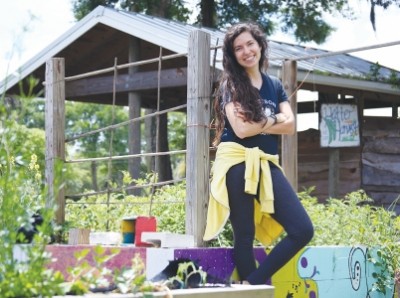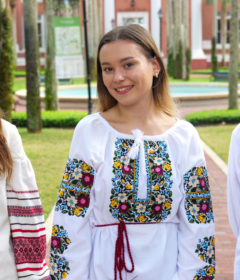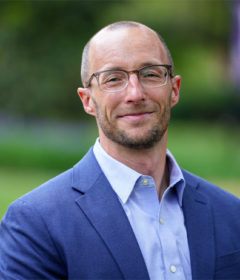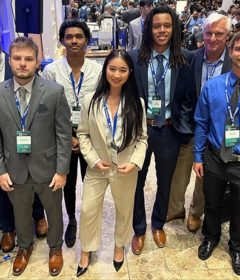Taking Care of Our Garden
 How serious is the global food crisis? Just ask Sasha Pesci, ’14, a recent graduate, and she’ll be happy to tell you. “We are in need of finding sustainable ways of growing food that will allow us to be ‘food secure’ even when modernized unsustainable ways of food production shut down,” Pesci explains. “Let me put it another way. Sustainable agriculture is a way of food production that is concerned with still being able to continue growing edible plants in the future.
How serious is the global food crisis? Just ask Sasha Pesci, ’14, a recent graduate, and she’ll be happy to tell you. “We are in need of finding sustainable ways of growing food that will allow us to be ‘food secure’ even when modernized unsustainable ways of food production shut down,” Pesci explains. “Let me put it another way. Sustainable agriculture is a way of food production that is concerned with still being able to continue growing edible plants in the future.
“That’s why I got involved in Hatter Harvest,” she adds.
Pesci, an international student from Argentina, is an environmental science and geography major who says she’s not only environmentally aware but also socially aware.
“Almost everything and anything we do has some sort of social and environmental impact,” she asserts. “And this starts with our consumption pattern.
“When we go to a store and buy an item,” she adds, “it may have been industrially produced in a facility where humans are being exploited and one that greatly pollutes air and water. On the other hand, maybe it was handmade or grown by someone who lives a couple blocks away who uses practices that aim at not damaging the natural environment.”
She believes that “most of us don’t think about the origins of things, whether it be food or any type of item.” Pesci knows, however, that being environmentally and socially aware doesn’t mean doing everything with no negative impact on any living being. She just wants people to reflect more on their choices.
“We need to at least think about the implications of our actions,” she explains.
Originally from Mendoza, Argentina, Pesci is a bilingual student whose first language is Spanish. She also has traveled to many Spanish-speaking countries, including Mexico, Costa Rica and Peru, and took advantage of opportunities in Stetson’s Latin American studies program.
Visiting these places helped her to learn a lot about her passion: the environment and sustainable agriculture.
Pesci has lived her values in Peru, Costa Rica, Mexico and at the IMPACT Conference in Indiana. The summer before her sophomore year, she traveled to Campeche, Mexico, for an internship. There, she interned at a center for sustainability and volunteered at a sea turtle conservation camp. And her travels have made her aware of the many problems with the way food is grown in the modern world.
“The Hatter Harvest garden is a place where students get to learn how they can grow their own food in a sustainable way,” she points out, adding that they “learn about plants, spend time outside, interact with other students or community members, and learn about healthy lifestyle choices.”
Pesci has been deeply involved with Hatter Harvest since some friends told her about the opportunity. “For me, it started out as more of a social activity or hobby. I started taking it more seriously when I realized the positive impact that it has on the surrounding community and natural environment.”
How is Hatter Harvest different from other ways of growing food? “Our gardening approach highly considers the needs of the natural environment,” she says. “We don’t use any type of synthetic pesticide or fertilizer since these are detrimental to the soil and the atmosphere for the long term.”
Plus, the crop diversity found at Hatter Harvest contributes to the overall biodiversity of the ecosystem, according to Pesci. “Our community garden allows us to be exposed to healthy foods that may not be accessible otherwise,” she says.
“When supporting local farmers, we are supporting a market that contributes to the sustainability of human existence on our planet.”
Pesci maintains that sustainable agriculture is important because it’s concerned with “still being able to grow edible plants in the future without sacrificing our needs or the needs of any other living species in our ecosystem.”
Industrial ways of agriculture greatly damage the soil and the atmosphere, according to Pesci.
In her junior year, she immersed herself in Stetson’s garden and became president of Hatter Harvest. How has this experience influenced her future endeavors? “Four days after graduation, I will be going to California to participate in a program called Worldwide Opportunities in Organic Farms. I’ll be volunteering on organic farms in exchange for food and lodging,” she says.
Then she plans to take what she calls a “gap year” and travel around South America while continuing to volunteer on organic farms and learning more about sustainable agriculture.
“Hatter Harvest greatly influenced my interest in agriculture and inspired me to work to improve our global food system.”
By Kalee Ball, student editorial assistant for Stetson Magazine, is a Hatter Harvest volunteer.



